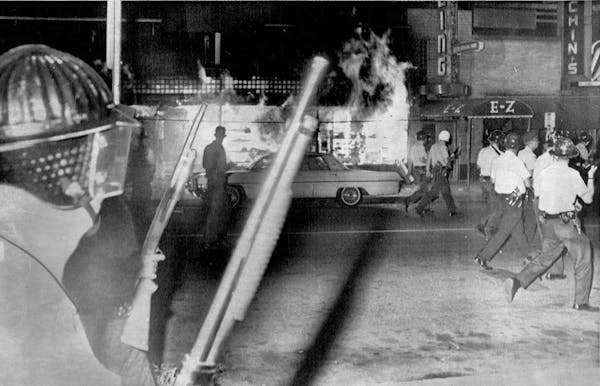This morning I couldn't decide whether or not to wear my Black Lives Matter T-shirt to work.
Today I rode in a squad car with a white police officer and sat with a grieving black parent. I want to share my experience in the hope that it might help fists unclench.
I want to wear my shirt because I support Black Lives Matter. I have been to marches and protests, and am committed to a faith community that supports the BLM movement. I am a social worker at a school in north Minneapolis that has one of the highest rates of poverty and homelessness in our district. Many of my students struggle with emotional and behavioral challenges that profoundly limit their ability to find success in school or beyond. Many of their families suffer from generational poverty, incarceration, addiction and ongoing community violence. And most of them are black. Inequity, oppression, mass incarceration, discrimination and prejudice have deeply scarred many of the children I work with. Black Lives Matter. To me.
I don't want to wear the shirt because it necessarily puts me in opposition to the Minneapolis Police Department. My job is dangerous. In my school, our dedicated team works with highly traumatized, hypervigilant, and often aggressive children who have been shown to be a danger to themselves or to others. Despite best efforts to end the "school to prison pipeline," the district has given us a school resource officer (SRO) to assist us with students who escalate out of our control. The SRO has helped me find runaway middle-schoolers, make welfare checks on truants, calm frantic parents, and transport children in crisis, and has helped me navigate the dangerous parts of the neighborhoods my students call home. My SRO does his job well, and I rely on him to help me do mine.
Today he drove me by the protest over Sunday's shooting of Jamar Clark by Minneapolis police. The officer shared his thoughts on the shooting, and I listened to his point of view, grateful that he was willing to speak honestly about his frustration with BLM in general and this situation specifically. He defended the officers and the department against what he felt were unfair accusations. I was uncomfortable, but I listened. We were on our way to help a mother find her 12-year old daughter, who never came home last night. We found the student and saw an emotional reunion. The parent was deeply grateful to the officer.
A few hours later, I was sitting with a mother whose 10-year-old son, another of our students, had witnessed Sunday's shooting when he ran outside his house. She described how he was "extra clingy" since then and asked that he be excused from school for an extra day. She shared her thoughts on the shooting, and I listened to her point of view, grateful that she was willing to speak honestly about what had happened at her doorstep, how it affected her family, her exhaustion and her rage. We will welcome her son back to school when he is ready and try to help him heal, being present to the fear he and his peers grow up with.
My job puts me in the middle of this storm.
I support #JusticeforJamar. Black Lives Matter. I want the racial wounds of this nation to be acknowledged. I want the cycles of violence that harm our black children to be stopped. I want white privilege to be dismantled. I want freedom and justice for all. But I also want to recognize the allies in the ranks of those we may label as enemies. Our white resource officer does more to protect the lives of my black students than anyone else I know. He offers them support and friendship in school and in the community. He supports parents, and he supports me.
His negative views of Black Lives Matter discourage me. As do the negative views many black parents and children hold toward white police officers trying to protect and serve.
The storm swirls around us all, deafening, unless we take time to listen to one another.
Rebecca Stewart, of St. Paul, is a school social worker.

The little park that could … be better
Climate change looms large this election year
For this Minnesota legislator, action targeting child abuse is intensely personal


